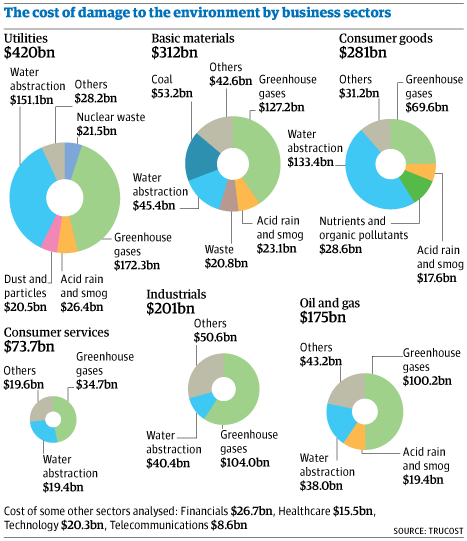Uit een studie uitgevoerd in opdracht van de Verenigde Naties blijkt dat de 3.000 grootste bedrijven op deze wereld samen voor 1,6 biljoen( = duizend miljard) euro aan milieuschade veroorzaken oftewel ongeveer 1/3 van hun winst. Meer dan de helft van de schade draagt bij aan de wereldwijde opwarming van de aarde terwijl de rest komt van schade aan water en de lucht. De werkelijke schade zal nog veel hoger liggen omdat niet alle gevolgen direct in geld uit te drukken zijn.
World's top firms cause $2.2 trillion in environmental damage
The world's 3,000 biggest public companies do more than $2.2 trillion worth of damage to the environment every year, amounting to one-third of their total profits, according to a report commissioned by the U.N. Environment Program and the Principles for Responsible Investment initiative.
The study was carried out by researchers from the London-based consulting firm Trucost. Later this year, another U.N. study is expected to recommend ways to stop this damage, such as by taxing or otherwise penalizing polluters and eliminating massive public subsidies to destructive industries.
"What we're talking about is a completely new paradigm," lead researcher Richard Mattison said. "Externalities of this scale and nature pose a major risk to the global economy and markets are not fully aware of these risks, nor do they know how to deal with them."
"Externalities" refer to costs of production borne by someone other than the producer or consumer. Under the current economic system, nearly all environmental destruction is an externality.
Well over half the $2.2 trillion figure in the Trucost report comes from current and anticipated effects of global warming. The remainder comes from effects such as air and water pollution.
The true cost of these companies' operations is actually much higher, however. In calculating cost, the researchers did not take into account destructive effects from the consumption of the companies' goods and services, long-term damage other than global warming, or effects not easily put into economic terms, such as social disruption or loss of biodiversity.
The study warns companies that if they do not take action to reduce their environmental footprints, governments may force them to do so with new taxes or regulations.
"It's going to be a significant proportion of a lot of companies' profit margins," Mattison said. "Whether they actually have to pay for these costs will be determined by the appetite for policy makers to enforce the 'polluter pays' principle. We should be seeking ways to fix the system, rather than waiting for the economy to adapt."
